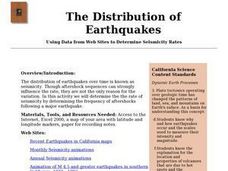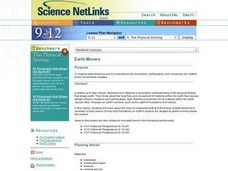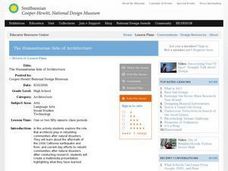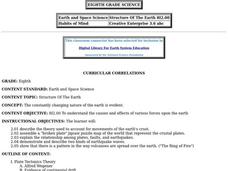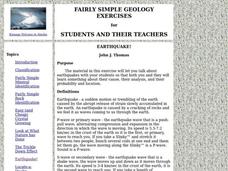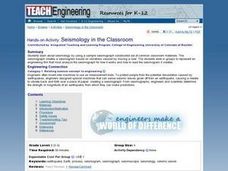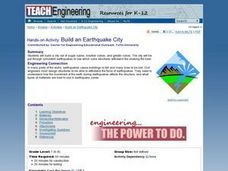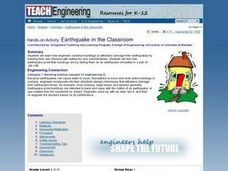Curated OER
Plotting Earthquakes: Diversity of Learner Adaptation
Students are divided into four groups that study four separate ecosystems in the community. They first do a field examination for the purpose of developing a detailed report of an ecosystem. Students do a detailed analysis of the...
Curated OER
The Distribution of Earthquakes
Students determine the rate of seismicity by determining the frequency of aftershocks following a major earthquake. They incorporate the use of the Internet, Excel 2000, a map of their area with latitude and longitude markers, and paper...
Curated OER
Earth Movers
Learners read an online article about an earthquake and follow up with a series of discussion questions about earthquakes. They answer questions in their science journals about continental drift, plate tetonics, and their influence on...
Curated OER
Investigating Earthquakes: GIS Mapping and Analysis
Students describes the technique of preparing "GIS-ready" data and shows how to map that data and conduct basic analyses using a geographic information system (GIS).They use latitude and longitude fields to plot the data in a GIS and...
Curated OER
Tracking Current "Earth" Events
Eighth graders utilize Internet research skills, and practice their communication skills by presenting their research to the clas. They actively consider the types of hazards for humans associated with Natural Disaters and ways that...
Curated OER
Whole Lotta Shaking Going On
Pupils explore earthquake activity in California. They observe the historical data and create databases and graphs of the earthquakes. Students analyze the data and form a hypothesis about future earthquakes.
Curated OER
The Earth's Crust
Students use clay to form models of the different landforms and then complete a data table using a map, atlas, or the Internet to locate famous landforms in the United States. Students complete various activities, writing down their...
Curated OER
The Humanitarian Side of Architecture
Students explore the role that architects play in rebuilding communities after natural disasters. They investigate the aftermath of the 1906 California earthquake and fires, and current day efforts to rebuild communities after natural...
Curated OER
The Fault Line
Students use cardboard models of the North American and Pacific plates and sand to investigate what happens when there is an earthquake or movement along the boundaries of the plates.
Curated OER
Earthquake!
Students gain an understanding of earthquakes. They examine vocabulary associated with earthquakes, how earthquakes happen, and preventive measures taken to diminish damage or harm in the event that an earthquake should happen.
Curated OER
Volcanoes In Japan
Sixth graders study the characteristics of volcanoes in this unit. They apply the research to the study of three volcanoes in Japan. They complete mapwork, identify indicators of impending volcanic activity, and describe the dangers...
Curated OER
Mercalli Scale Illustrated
Young scholars study the Mercalli Scale and analyze how it is used to rate earthquakes. They construct a booklet with drawings that represent each rating of the scale. They study why engineers develop rating scales for earthquakes.
Curated OER
Volcanoes
Second graders review the characteristics and aspects of volcanoes. Using this information, they write a creative story and draw illustrations to accompany the words. They use geographical terms to describe a location and the physical...
Curated OER
Natural History of Costa Rica
Young scholars use outline maps to become acquainted with Costa Rica. They see how it was formed and how its origin has created very diverse environments. Students then use atlases and compare their physical maps with maps of climate and...
Curated OER
Structure of the Earth
Sixth graders investigate earthquakes and volcanoes. They demonstrate fault lines with a folded piece of paper, conduct an erosion experiment, and construct a volcano using clay, baking soda and vinegar.
Curated OER
Structure of the Earth
Eighth graders examine the forces that are constantly acting on the Earth. They describe the theory of tectonic plates and demonstrate the two kinds of earthquake waves. They also examine the role of volcanoes in the structure of the...
Curated OER
Earthquake!
Learners study causes, probability and location of earthquakes. They complete a number of activities and look at web pages to examine the characteristics of earthquakes.
Curated OER
Locate-a-quake
Student, use seismic readings of the same earthquake from three recording stations and locate the epicenter of an earthquake on a map.
Curated OER
Finding an Earthquake's Epicenter
High schoolers examine the process used to identify the epicenter of an earthquake. They identify the Richter scale and interpret a seismograph reading. They also view photographs of the aftermath of earthquakes.
Curated OER
Magnitude of the Richter Scale
Learners examine how a Richter scale operates. They create a booklet illustrating each rating on the scale. They discover how engineers use different measurement tools.
Curated OER
Seismology in the Classroom
Students work together to use a sample seismograph. They role play the position of an engineering firm that is to analyze the machine. They discover how engineers develop new machines to take measurements.
Curated OER
Build An Earthquake City
Students work together to build an earthquake city. They simulate the shaking during an earthquake to discover if their structure is built well enough. They discover how engineers complete these types of tests to develop better...
Curated OER
Earthquake in the Classroom
Young scholars discover how engineers construct buildings to stand up against earthquakes. They build their own structures out of marshmallows and toothpicks. They test how earthquake-proof their building is with jello.
Curated OER
Drifting Continents
Learners, through teacher-led demonstration, explore the idea of continental drift. They complete a worksheet involving the calculation of continental drift over time.



